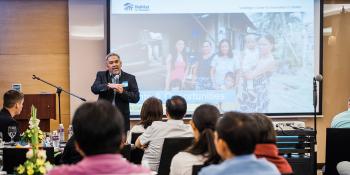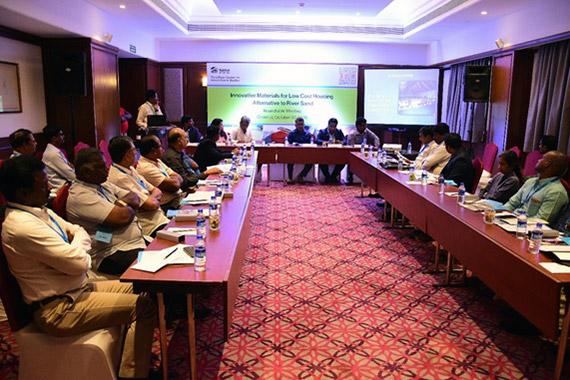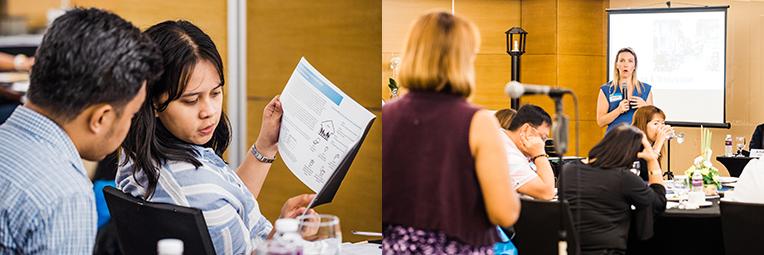
Strengthening housing markets
MANILA (Dec. 20, 2018) – With an estimated 120,000 people migrating to Asia-Pacific cities each day, there is a pressing need for decent, affordable housing. Yet high housing costs in cities limit access to affordable homes, particularly for the urban poor who tend to be underserved by banks given the informal nature of their work or the lack of formal residency status. Through the Terwilliger Center for Innovation in Shelter, Habitat for Humanity facilitates more efficient and inclusive housing market systems making affordable housing possible for millions more families.
Typically, low-income households construct basic dwellings that they extend or improve as their resources allow. The process of housing improvement itself is often a ladder out of poverty for families. These changes benefit the larger community, reducing inequality and building resilience against economic and natural disasters.
Given the importance of housing in sustainable development, there is great potential for serving low-income families’ shelter needs. However, if housing development is left solely to the market, only those with middle incomes and above will be served, as an Asian Development Blog post argues.
The Terwilliger Center aims to play a catalytic role by stimulating changes in market systems including supporting local firms to meet the shelter needs of low-income families.
“In addition to building and repairing homes, Habitat’s research shows that the housing gap in Asia-Pacific can be addressed by expanding the capacity of private sector companies to offer accessible housing and construction products and services to low-income markets. Based on our market systems approach, we aim to provide these companies with the opportunities and the right tools to not only be sustainable but also thrive in these consumer segments,” explains Naeem Razwani, Director of the Terwilliger Center for Innovation in Shelter in Asia-Pacific.
In India, the Terwilliger Center is launching initiatives to attract companies in two promising market niches: manufactured sand and skilled construction labor. A growing industry in India, manufactured or M-sand which is produced from the crushing of stones and other aggregate materials has seen demand reaching approximately 700 million tons in 2017. The use of the high-quality sand that is free from impurities mitigates the environmental risks. Procuring sand from natural sources such as river beds and banks often creates imbalances in aquatic ecosystems.

Participants at a Chennai roundtable co-organized by Habitat’s Terwilliger Center for Innovation in Shelter.
To promote the mainstream use of manufactured sand, the Terwilliger Center and the Indian Concrete Institute organized a roundtable in October where experts discussed sustainable alternatives to river sand in the affordable housing market.
In the area of skilled labor, the Terwilliger Center is looking to equip masons and constructions workers with technical knowledge and keep their skills current to build more durable, disaster-resilient housing. In large-scale markets like India’s with more than 40 million construction workers, the building or improvement of low-income housing is primarily a homeowner-led process. To save on material and labor costs, families may be driven to adopt unsafe building practices, resulting in structures that are non-durable and vulnerable to natural disasters.
The challenges are similar in the Philippines where Habitat’s Terwilliger Center for Innovation in Shelter has unveiled Bahay, Buhay (meaning “house, life” in Tagalog), a report that investigates homeowner-driven housing construction practices, financing modalities and aspirations for resilient homes in disaster-prone areas in Cebu Province. The report was published with the support of the Hilti Foundation.
In November, participants at a roundtable organized by Terwilliger Center in Cebu City discussed the report’s main findings and gleaned insights from organizations looking to tap into opportunities in providing financial services and housing products to low-income markets. Learning from experience following 2013’s Typhoon Haiyan, the research demonstrates that there is a strong demand for specialized labor, resilient materials and low-income financing products in the country.

Findings from the Bahay, Buhay report (left) were presented and questions asked (right) at the roundtable in Cebu City, the Philippines.
To tap into the Philippine market, the Terwilliger Center will identify local companies and advise them on how to expand innovative services, products and financing so that households can carry out incremental house construction or improvement more effectively and efficiently.
In both India and the Philippines, organizations, professional associations, academics and other interested parties can apply to join the Terwilliger Center’s programs by sending an expression of interest alongside an organizational or professional profile. Selected organizations will receive financial and technical support, and will benefit from Habitat’s knowledge of low-income housing, and latest findings from on-going research on construction labor practices and global best practices.
In India, expressions of interest can be sent to [email protected].
In the Philippines, please email [email protected] to find our more and submit your expression of interest.